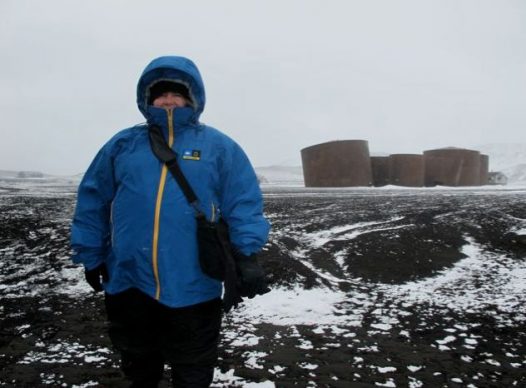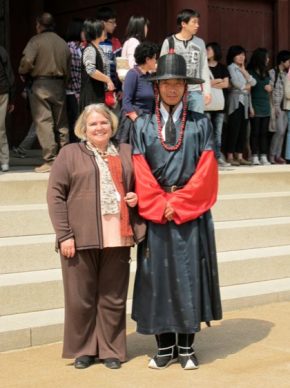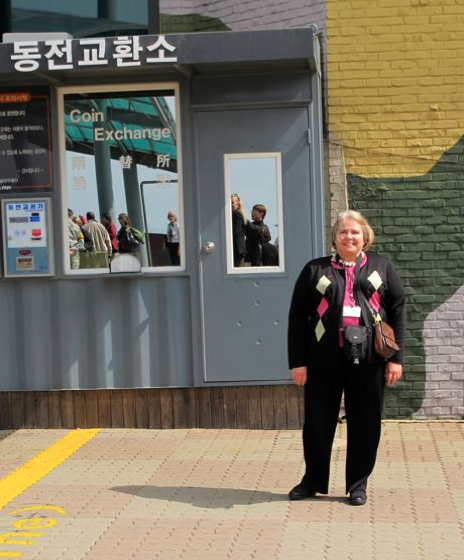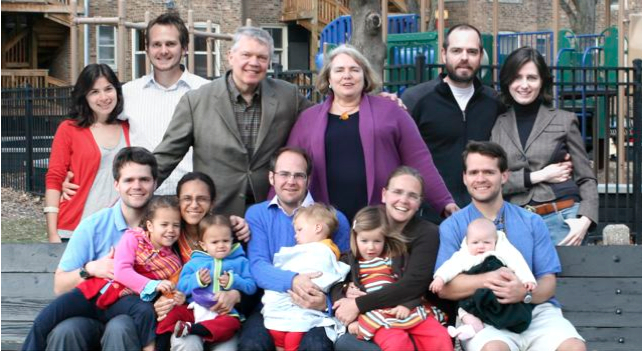San Francisco, CA, September 2010
This dynamic mother of five grown children shares her love of travel, of reading, of science and her admiration of her own mother. Camilla serves as the Church’s Public Affairs representative in the San Francisco Bay Area, and she further contributes to her community by being a trustee of the National Public Radio foundation, the UC Berkeley Bancroft Library, the San Francisco Interfaith Council, and Clog America.
I grew up in a big family with seven siblings. My place in the family was special because I was five years younger than my next older brother, the only girl born between four boys. As the youngest girl, I was in a great position and very close to my mother.
What was your mother like?
For a Mormon woman of her era (she was born in 1907), she was a free woman, meaning she did what she wanted to do. That had a lot to do with my father, who wanted her to be happy. That’s a great gift, to have a husband like that. As the older children grew up, we helped with the family responsibilities and my mother felt totally free to travel every summer and leave the younger children with my father and the older children. It was a pretty unusual situation.
My mother had enormous energy and interest in many areas. She felt it was her right to pursue those interests. My mother worked a full-time job all of my life. She taught school. She was also a natural-born leader. She was a poet, published three books of poetry and five of prose, a member of Pen Women and was a member of the Utah Poetry Society. When she was in college, Mother received an efficiency award. She’d say, “Efficiency is the best, the most, in the least amount of time. Time is always an element. You try to do the best you can, but always remember that you can’t overspend time on it.”
I grew up with my mother’s philosophy and a real sense that I had a responsibility to the community, particularly the church community. Mother felt a responsibility to all of her communities and to the Mutual Improvement Association (MIA) as a general board member.
Another thing she was very talented at was making me feel that I was her favorite child. When I talk with my siblings, each one has something they particularly shared with her, so she had a way of figuring out what you were interested in so you felt special. It wasn’t artificial, she truly was interested in you. For example, I loved literature and writing and wanted to be an editor. When I worked for The Putnam Publishing Group in New York as an editorial assistant, I would send her books we were publishing. She read everything, and would say, “Oooh, that was pretty sexy.”
You attended graduate school at Columbia University in the 1960s. How did a Mormon girl from Utah end up in New York City and how did it change you?
I went on a BYU Study Abroad to Grenoble, France during my sophomore year of college and that opened my horizons. Additionally, both my mother and father were very broadminded people. My father cared most about whether or not you were a good person. It wasn’t whether or not you were a good Mormon or were rich or poor or were of a certain class. Because my father spoke Spanish so well he translated for the migrant workers who lived in the community. He always did that, kind of quietly. Mother was much more of a social person, but she had friends from all walks of life and all situations, and dealt with them equally. For example, two men lived next door to each other and were her friends from her poetry group. I remember her saying to me, “Oh, they’re probably homosexuals. Isn’t it too bad we have to label people?” This was early on, maybe in the 1960s.
My parents’ worldview helped me feel that I was not just a Mormon girl, but I had further horizons. I felt very free to travel and after my senior year of college, I worked for the National Association of Food Chains in Washington DC. (an editing job). I loved my job in Washington BUT my friend Sally Ann said, “You have to come to New York, it is the place for you.” I felt, “Okay, that’s the thing to do.” So I moved to New York.
I always went to church while I lived in New York City. But I remember having a crisis of faith when I was in graduate school and we were studying literature. I was taking a course called “Black Literature,” and one of the authors of an assigned book wrote about how he had given up what he called “tribal religions” to become a Bahá’í. Why? Because he viewed Christianity, Judaism and Islam as tribal religions. The nature of a tribal religion is that it excludes anyone who is not part of the “tribe.” I thought about that (and of course Mormonism is very tribal) and agreed with him that tribal religions were destructive. I remember thinking that I could give up the church because excluding others is not what a loving God would do. Then I started thinking about family and how important family is for the development of a child and obviously a baby would not survive without a family, which is actually just a small tribe. So the tribe was probably not the problem. Everyone needs a family and that tribe to give them strength, but then that strength should be focused outside of the tribe and community rather than trying to keep people huddled together. That’s really at the core of my religious faith. I am a very religious person. I am a very religious Mormon. But the purpose of the church is to make people strong in order to reach out to the larger world, and not to keep us isolated from the world.
What other organizations have you been involved in—besides your family?
Certain issues really interest me. One such issue is learning what it is to be human. It’s so mysterious to me. I’m a believer in the evolution of man, so I naturally question what is the change that took place between the anatomically human person that existed for a million years and what evolved about 50,000 years ago as the modern human? There’s something that took place. It probably had to do with language and symbolism. . . something happened in the brain. We were anatomically human making simple stone tools that didn’t change for a million years. Then something happened that affected humans’ ability to learn, innovate, and seek for new ideas. This interest is why I’m a trustee of the Leakey Foundation, which does research into human origins and ape studies.
Other organizations? A friend introduced me to the University of California-Berkeley Bancroft Library specifically to help them with their newsletter, so I got very involved with the Bancroft Library at U.C. Berkeley and I write the newsletter for their special collections library. I love such positions. I love associating with scholars and researchers.
I’m also a trustee of the National Public Radio Foundation. For that endeavor, I am particularly interested in public education and science education in which we are woefully lacking in the United States.
I also love my church job. I do public affairs work for the church. I’m on the executive committee for the San Francisco Bay Area. It’s a long-term job; it’s not a job that changes every two years or so. With public affairs work, I form long-term relationships within the community. I work on interfaith relations and on foreign consulate relations.
So has this been a difficult job for the last few years with the recent political discussions about same sex marriage in California?
Yes, but it’s an interfaith council. We have Catholics on the council and Muslims—all of whom feel similarly to Mormons about same-sex marriage. The interfaith community is interesting because we understand that we will disagree on moral issues but there’s warmth and an understanding of differing opinions.
Some interfaith organizations say, “Don’t give prayers or say anything that would be offensive to other people.” But our group says, “We want authentic expressions of faith from you. So we expect you to pray before us as you would pray in your church or synagogue. That’s a very freeing experience.” People pray to Allah, and you really do get to understand what other people feel.
There was so much negative media with Proposition 8 (The California Marriage Protection Act) on our church and protesters picketed at the temple. When I went to an interfaith board meeting soon afterwards, there were nothing but expressions of sympathy and understanding that this was a very painful issue for Mormons. The other council members may not agree with us, but they didn’t want us to be the target of such hostility. It was quite a remarkable experience for me, especially because I personally do not support Prop 8. I think families come in different forms. But my church supports Prop 8 and I represented them and I found the interfaith community support for my church quite remarkable.
You have five adult children. Have your notions of what it means to be a success changed as you’ve raised your children?
That’s an interesting question. I’m a big believer in education, so it’s easy to feel successful when you see your kids wanting to be educated and work in fields like medicine or education, as three of my children do. When you have someone like my son George, who is focused on music and hasn’t graduated from college, defining success is harder. If anything, he’s the brightest of our kids. I adore him and want the best for him and it’s somewhat of a hard life that he’s chosen.
George has probably influenced you in ways that wouldn’t have happened if everyone had followed a path similar to the one your other kids chose.

Camilla in Antarctica
That’s true. Because of George, I actually went to a rave. George was organizing a rave party [all night dance party] so I went. He met me at the door with earplugs. At the end there were a bunch of teenagers dancing all night. His comment to me was, “See, they just want to have a place to dance.”
You’ve learned not to look at his path as a limiting path.
It’s a different path; a creative path. I think it’s dangerous sometimes but I don’t see it as a failure. It’s interesting because he kind of wants to be on his own, but at any family event, he’s there. He always attends.
Can you tell me about some of the most interesting places you’ve traveled?
Recently my sister Rosemary and I went to Antarctica, which was fantastic. It was an expedition with National Geographic. We went on Zodiacs [inflatable boats] out to the shore and walked among the penguins. We learned a lot! Travel is an educational thing. I don’t think travel is somewhere to go just to sit; you go to learn something about the people and about the terrain and about history.
My husband and I went to Mongolia, where we stayed in round tents called “gers”. Mongolians had the largest land empire in history. It was brief and they did not leave behind what the Roman Empire left because they considered language sacred and did not want other people to speak their language. Mongolians were mainly interested in trade.

Camilla in Mongolia
I am also an advisor to Clog America [a world performing folk dancing troupe] and have traveled with them for four years. That has been particularly interesting because I meet local people who share their own traditions. I’ve been to Sardinia, Slovenia, and to the South of France. We recently had a festival in Istanbul and I was there for a week and dancers from Sierra Leone and South Korea attended (and did such a marvelous dance!) The folk dance the South Koreans performed was from early Korea. Korea was settled by Mongolians and a third of Japanese noble names are Korean. I knew that the Japanese tea ceremony originated in Korea, but I was talking to the Korean dancers, and their choreographer in particular, and asked her where the dance came from. That was a revelation to me, because it’s clearly very ancient and I think probably from Mongolia. Folk dances kind of pull all of that history together. When you see it, it’s kind of a gestalt—it brings it all together.
Has travel affected your relationship with the gospel?
When I first went to the temple, I was surprised that the temple is so ritualized and mysterious and has little to do with what I normally love about the church—which is that it’s a lay church and we all try to help each other be better people. Another time when I was at the temple, I was thinking about the humans in the Lascaux cave [one of a group of caves in southwestern France famous for its Paleolithic cave paintings]. Early man did not live in those caves—they used them for ceremonies. There is something in the human psyche that needs ceremony and symbolism. The seed for the modern human can be seen in those caves in France. When I go to the temple, that’s what I think about. I think that I’m doing a ritual that goes back to original rituals. Not that our temple ceremony has evolved from that, but that our need for ritual is part of what it means to be human. Understanding such things from having seen these places helps me to make sense of church teachings and practices.
At A Glance
Camilla Smith
 Location: San Francisco, CA
Location: San Francisco, CA
Age: 64
Marital status: Married
Children: Four sons and one daughter
Occupation: Writer/editor, Trustee: National Public Radio Foundation, LSB Leakey Foundation, San Francisco Performances, San Francisco Conservatory of Music, Music & Menlo, UC Berkeley Library Advisory Board, UC Berkeley Bancroft Library Council of Friends, Interfaith Center at the Presidio.
Schools Attended: BYU (BA), University of Grenoble, France (Certificate D’Etranger), Teachers College at Columbia University (MA)
Favorite Hymn: “Come Thou Fount Of Every Blessing”
Current Church Calling: Bay Area Public Affairs Executive Committee
Interview by Shelah Miner. Photos used with permission.
At A Glance


